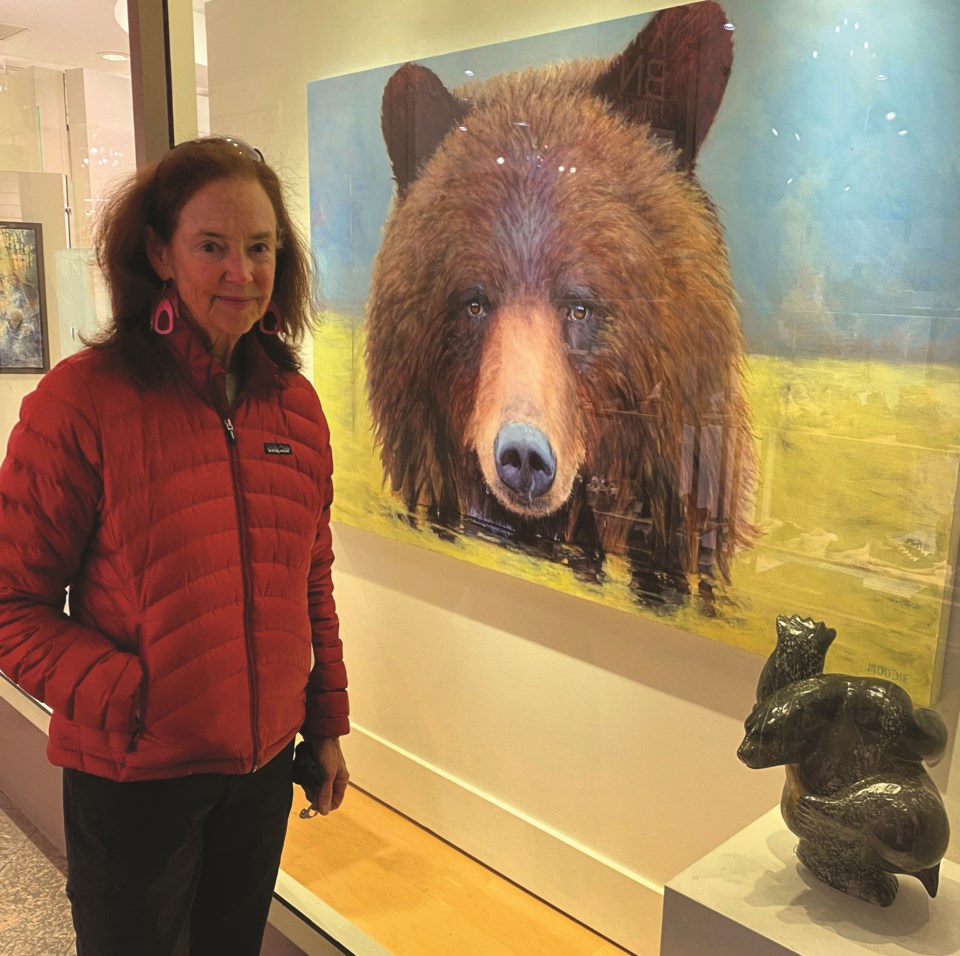Last week, a Saskatchewan woman was poring over Doria Moodie’s painting of a bear—a common sight in the Whistler art scene—hanging at Mountain Galleries in the Fairmont Chateau.
Taking in the forlorn-looking grizzly that is the focal point of the piece, she notices in the background what she thinks are golden fields of wheat set against a cerulean sky. That is, until a lightbulb goes off: that’s not a scenic horizon behind the bear, but the distinct yellow and blue of the Ukrainian flag.
“She was standing in front of it and when she realized what Doria had done, she started to cry,” says Wendy Wacko, founder of Mountain Galleries, which counts locations in Whistler, Banff and Jasper.
Although as a conservationist Moodie has long been a vocal advocate for B.C.’s bears (along with being the official artist for the Grizzly Bear Foundation, she is also a board member), that was about the extent to which her art and her politics intertwined. But with news of Russia’s brazen invasion dominating the airwaves, it was almost by osmosis that the symbol of Ukrainian resistance made it into her piece, titled Just Stop.
“I was in the process of painting this large bear in the water and listening to the news and being quite overwhelmed by it all,” she says. “It just kind of organically happened. The water colour changed and it became a sort of battered Ukrainian flag.”
The piece comes with an added layer of meaning that was something of a happy accident for Moodie. The bear has been a symbol for Russia since at least the 16th century, and a complicated one at that. British and U.S. media over the years have depicted the Russian bear in unflattering terms, often as a big, clumsy brute. Russians themselves have claimed the bear at various times, including Russian President Vladimir Putin’s own United Russia party. It wasn’t until she was partway through the painting that Moodie caught on to the symbolism, with her bear’s unmistakably sad eyes serving as an effective stand-in for the Russian dissenters who have spoken out against Putin’s single-minded aggression.
Moodie was motivated in part by the helplessness so many have been feeling watching the images of carnage and devastation beamed back from the frontlines. She and her husband quickly donated to a special military fund set up by the National Bank of Ukraine. Even still, she felt the pull to do more.
“Like everybody else I feel pretty powerless. It’s frustrating,” she says.
Soon, a plan was hatched. Wacko, who married into a Ukrainian family, offered to buy the painting for Mountain Galleries’ inventory so it could be resold, with Moodie donating her respective share to Doctors Without Borders in Ukraine, a charity with a close connection to the gallery.
“One of our artists, who we can’t name because she doesn’t want to be named, is a doctor and she’s over there. She’s working with Doctors Without Borders,” Wacko says. “She’s one of the most extraordinary human beings I’ve met since I’ve been doing this, and she’s very talented.”
As it turned out, Moodie jumped the gun when she posted on social media that the painting had been sold. “I called Doria right away and said, ‘Good God, change the wording of that. It’s for sale!’” Wacko recalls. Almost instantly, Wacko began getting messages from prospective buyers inquiring about the piece. Wacko reassured them it was still available, and sold it to the Saskatchewan family that was originally so moved by it. It sold for $10,000, with just over $9,000 of that going to charity after Wacko’s framing and shipping costs were factored in.
“It felt really good to make a statement. As sad as it is, as appalling as it is, it felt good to break out of that mould,” Moodie says.
“I think people, even if they’re here on vacation and want to forget about the troubles of the world, they might like to see that we are paying attention.”
For an art scene catering primarily to well-heeled tourists, making overt political statements can sometimes risk alienating your clientele. But through this process, Wacko is realizing the importance of speaking out when it’s called for.
“The more response we get … it’s really made me realize it’s OK to make a political statement when it’s this important,” she says. “I don’t know anybody that would feel that it’s controversial and if they do, they’re not welcome in my gallery.”
Wacko has now tapped three other Mountain Galleries artists to donate paintings for the Ukrainian cause, and she plans to rotate one for sale every month at each of her three gallery locations.
“I’ll be delighted if we could raise $5,000 to $10,000 every month for this cause,” she says.
For more information, visit mountaingalleries.com.



